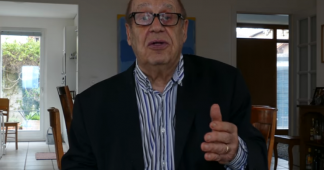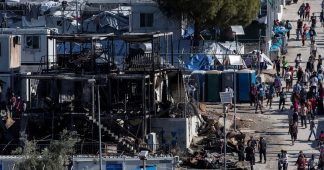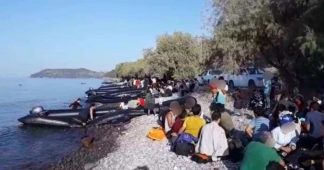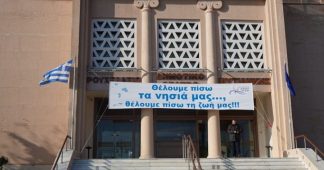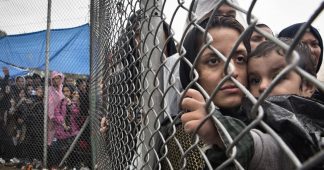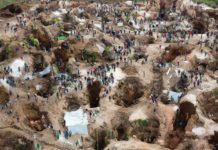They live in huts, without sanitation and without perspective: the EU wants it like that, says the globalization critic Jean Ziegler on the refugee camp Moria.
5/24/2019
The Swiss Jean Ziegler is one of the most famous globalization critics. In an interview, he talks about his experiences at the Moria hot spot in Greece, which serves as a refugee camp for migrants on the European external border.
ZEIT ONLINE: Mr. Ziegler, did you travel to the Moria refugee camp on the Greek island of Lesbos?
Jean Ziegler: I am here as vice-chairman of the committee of experts advising the UN Human Rights Council. This is one of the most important bodies of the United Nations, he reviewed the human rights policy of the 193 member states. On Lesbos I prepare a resolution on the so-called hotspots; those camps where the European Union keeps refugees and subjects them to a fast asylum procedure.
ZEIT ONLINE: What situation did you find in Moria?
Ziegler: A terrible one. Quite Terrible! The camp is located in a former barracks and is crowded with 5,000 people. That’s why there are unofficial camps all around the olive groves. Families from Syria or Afghanistan have cobbled together makeshift protective structures made of branches and plastic. In the middle of Europe they live in huts as they are known from Bangladesh or the slums of Honduras. 35 percent of the residents are children under 10 years.
ZEIT ONLINE: What consequences has the distress in the camp?
Ziegler: Here 100 people have to share a shower and a toilet. It’s often clogged, filthy, feces lying around. There is no hot water, no schools and just two doctors – for 5,000 people! The food that catering companies supply on behalf of the government is often inedible. Also the security is not guaranteed, although Greek police are on site. Many women do not dare to go to the bathroom at night because of rape. With all that, I first described the physical condition. The psychological misery is still added.
ZEIT ONLINE: What did you learn about it?
Ziegler: The people here often have terrible experiences behind them. Bombing, torture, shipwreck on the Mediterranean. Now they are sitting here in prison, surrounded by barbed wire, and they do not know what to expect. I talked to a young Afghan who lives with his family on Lesvos since February. His first appointment with theAsylprüfungsbehörde was announced for June 14, 2020. The procedures are delayed, and it is not the Greek judges who exercise the real power over the fate of these people.
ZEIT ONLINE: Who else?
Ziegler: The first survey will be carried out by officials of the European Asylum Support Office, EASO for short. This often takes only 15 minutes per person, according to computer specifications, tak tak tak. But how should someone who is traumatized report on such experiences as torture, rape, or persecution in such a short time? In order to talk about it, it takes time and a personal contact has to develop. If these people are not given the opportunity to explain themselves, then the dossiers on the basis of which the Greek authorities and courts judge are programmed for rejection.
ZEIT ONLINE: The EASO is not allowed to decide for itself, the national authorities do.
Ziegler: But the first survey marks the process. The universal human right to asylum is undermined by administrative trivialities. As early as 2017, the lawyers of the European Center for Constitutional and Human Rights (ECCHR) non-governmental organization complained to the European Ombudsman, with all the allegations that I am raising. In its reply, the EU Ombudsman stated that EASO’s actions raise serious concerns – but the case was dismissed and the investigation closed.
ZEIT ONLINE: Who should be sent back, but can still appeal?
Ziegler: Of course, Greece is a constitutional state. But the judges meet in Athens. They do not even get to see the asylum seekers. I express my admiration to non-governmental organizations such as Pro Asyl or Medico International, who, together with Greek young lawyers, are trying to enforce the objections in Athens. They are doing Sisyphus work.
ZEIT ONLINE: The EU blames the Greek government for all these conditions. They receive billions, but neither the supply nor the administration work. Would you agree with that?
Ziegler: Apparently, millions of dollars are allocated for feeding the refugees, and organizational efficiency is missing everywhere. For example, the United Nations Refugee Commissioner may provide emergency tents. However, the Greek government did not request them, so people have to continue to live in their plastic homes. Nobody understands that here. Perhaps there is also European pressure behind such decisions. The concrete heads in Brussels hope that terrible images from the camps will stop people. This is not only inhuman, but also unrealistic.
Published at https://www.tellerreport.com/news/2019-05-24
